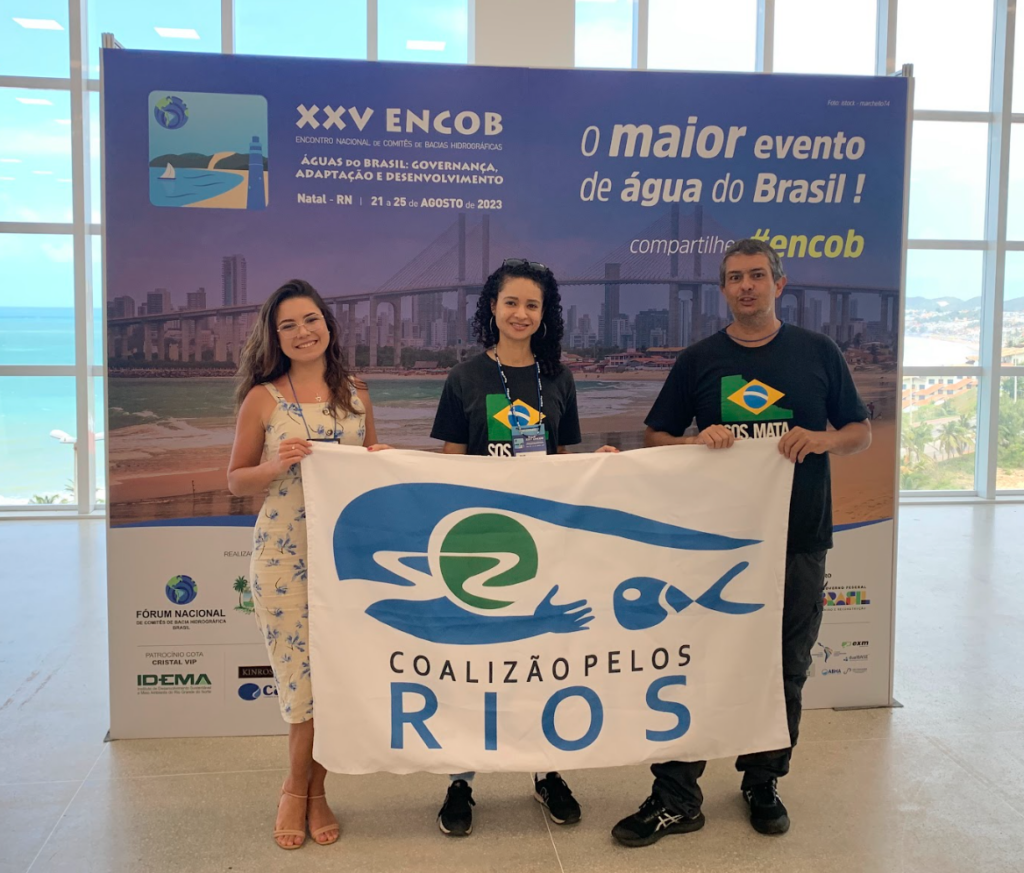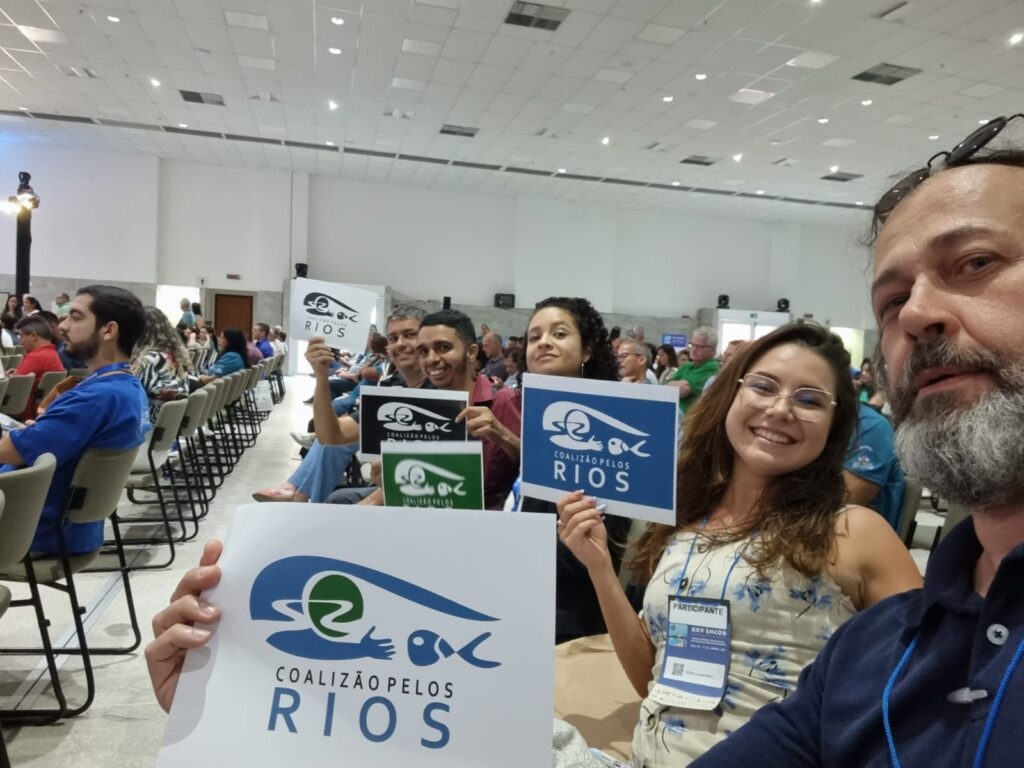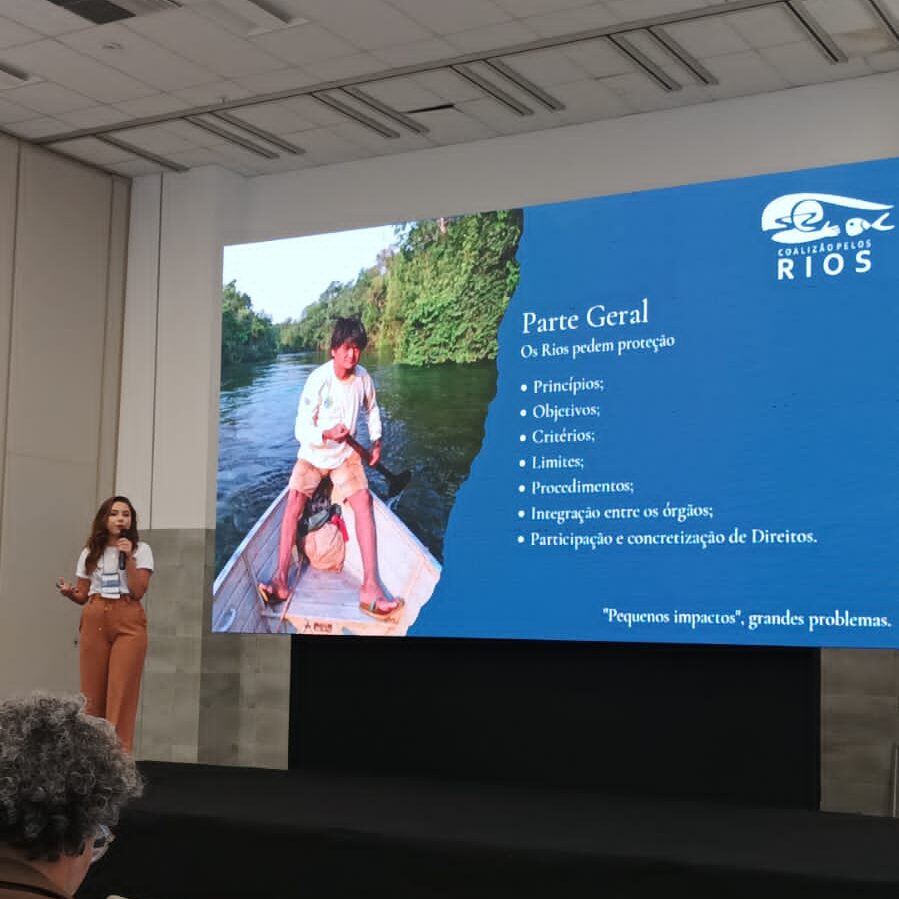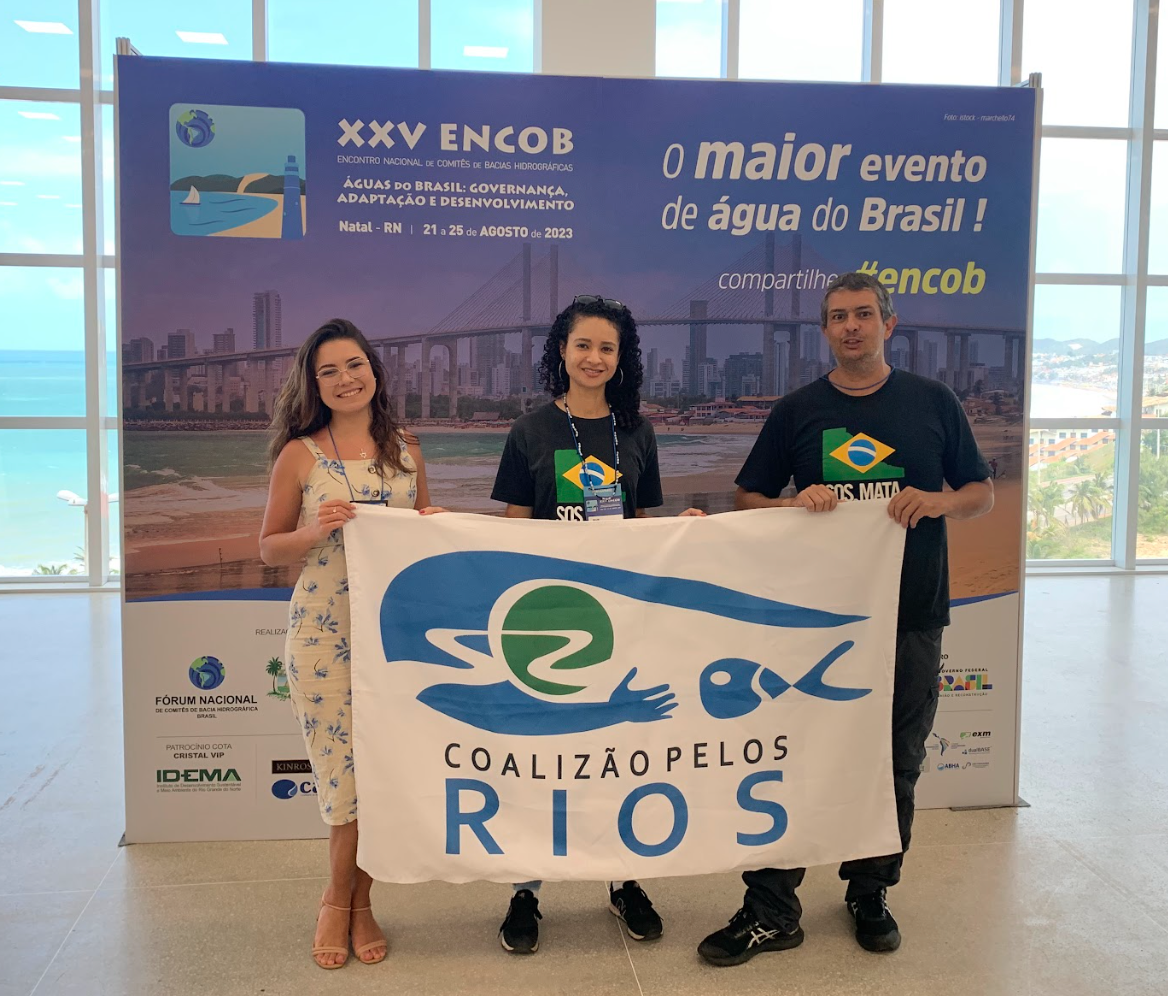By Vitória Leopoldina Gomes Mendes, a lawyer specializing in environmental law and member of Coalizão Pelos Rios
With the impacts of climate change increasing, the law has been a great ally in the protection of natural systems worldwide. My role as a lawyer in the Coalizão Pelos Rios (Coalition for Rivers), a non-partisan group composed of civil society organizations, researchers, and specialists engaged in the fight for the protection of Brazilian rivers, began in 2020 after an invitation from the International Rivers’ Brazil Program Manager, Flávio Montiel. Since then, the coalition has made many advancements for the protections of rivers in Brazil. This past week, with the support of International Rivers, I had the pleasure of representing Coalizão Pelos Rios at the XXV ENCOB – National Meeting of River Basin Committees, held in Natal, Brazil.
What is ENCOB?
ENCOB is an event hosted by the National Forum of River Basin Committees since 1999. The meeting brings together entities from the Integrated System of Water Resources Management in Brazil, representatives from both the public and private sectors that use water resources, non-governmental and civil society organizations, researchers, and many others interested in water-related topics. The event represents an important opportunity to exchange knowledge and experiences related to water management and governance from different regions in Brazil, as well as the possibility of technical training, inter-institutional dialogue, and communication.


In 2023, the forum’s theme was “Brazilian Waters: Governance, Adaptation and Development,” a title that highlights the vested interest of Brazilian stakeholders on the development of multiple uses of water as a resource. At the same time, this theme highlights the need to adapt and review water governance and management mechanisms and instruments.
The importance of Coalizão Pelos Rios’ participation
This was the first time that Coalizão Pelos Rios participated in ENCOB. Since 2020, our group has been discussing ways to protect Brazilian rivers. One of the avenues that we are pursuing is creating and utilizing legal instruments to permanently protect rivers in Brazil.
As a lawyer, I see that we can move forward in building more protectionist and ecocentric legislation. Despite having vast and complex environmental regulations, Brazil still treats the issue of water in a very restricted way, directed toward the development and optimization of its multiple uses. It is not by chance that we deal with “water resources” much more than with water overall.

As an invited participant and representative of the Coalition, I had the honor of presenting the Coalition’s work and strategy to the attendees, bringing a conservationist perspective that highlighted the need for political and legislative advancements in Brazil so that natural systems can be better protected. More than presenting, being present in such an essential place for defining water management gave me opportunities for conversations that brought greater clarity to the problems faced by the committees in conflict resolution, in dialogue with environmental agencies, and in the implementation of strategies.
International Rivers’ support was essential for the Coalizão Pelos Rios to achieve significant visibility for its work, and, at the same time, carry out a consultation process with stakeholders, monitor the current political context, and dimension and map the main problems faced by basin committees in Brazil.
Below is a list of the four key factors I observed during the event:
1. Riverside Communities: a social struggle that must be heard
One of the most relevant points I noticed from listening to speakers at the event was the awareness generated by the riverine communities. Attendees heard from fishing communities that shed light on various problems relating to contamination, sanitation, and other environmentally degradative actions that directly affect the food security and health of these communities.
The active participation of local communities generated important awareness. With this in mind, our action to establish limitations on the development of Brazilian rivers must include dialogue and input from these communities. Our project already considers several socio-environmental protections to address the ecological vulnerabilities to which these communities are exposed, however, the greater involvement of these voices in the political struggle for the enactment of the river protection project is imperative.
2. Water resource, not water
One point that caught my attention in several presentations was a clear preference for using the term “water resource” instead of water. In a lecture on governance, it was explained that water is a natural element, and on the other hand, when referred to as a water resource, we would be referring only to a “portion of water for specific use.” In my perspective, this is a clear political choice. I understand that a better clarification is required of what governance systems consist of for adequate protection of Brazilian water systems. It is not possible to deal only with a “portion” of water for specific use, but instead we need to deal with the entire water body and the accumulation of the impacts of different “specific uses” carried out on the same river or stretch of river, and with proper consideration of biological and ecological aspects, in addition to water capacity.
3. Absence of ecological aspects
Even though the event is entirely dedicated to water resource management, there were no panels dedicated to the ecological issues facing these systems. There was no emphasis, for example, on the issue of water quality, the maintenance of ecological processes in rivers, or the limits of these systems from a micro and macroecological point of view.
Only two parameters were widely discussed in the water resource management scenario: water and food security. When these parameters were discussed, they specifically addressed only the use of the river and not necessarily its conservation. It is extremely mechanical thinking about water. This is a point that must be considered in the creation of strategies by civil society within the Brazilian political context. We need to think about strategies for the insertion of ecological aspects in the political sphere. The river should not be thought of only as a body of flowing water, but rather as a living system that sustains a great diversity of ecological processes.
4. Autonomy and water governance: a problem called money
Among the main problems faced by the national basin committees, budget administration seems to be one of the main challenges for autonomy and water governance. In Brazil, there is great difficulty in politically prioritizing actions aimed at the conservation of natural systems. In this sense, the distribution of the public budget does not, as a rule, favor the implementation of conservation initiatives. This makes it difficult for the committees to generate more results and funding for the restoration and protection of rivers and river sections.
Because of this, one of the main ways for committees to capitalize stems from the multiple uses of water. In other words, there is a great struggle by the committees to enact laws that establish a charge for water usage. On the one hand, there is favoritism, prioritizing the capitalization of actions in the water basin, and on the other hand, the more users, the more financial resources. In this sense, a problem is created. Because, if the committees depend on the multiple uses of water to capture and fund the governance of rivers, there arises an interest in expanding the exploitation of that good. This generates a predicament where, to preserve it, it is necessary to capitalize on it, but to capitalize, it is necessary to explore rivers.
After participating in the event, I see the road to implementing a protection policy for Brazilian rivers is still long. It will require non-governmental organizations to strengthen their network to create a strong system with an adequate legal apparatus capable of facing the tangle of ineffective policies and solutions that are being built solely for optimizing the exploitation of water.
Reconciling ecological aspects with social struggles will be of great importance in this process, not only for protection in the face of environmental vulnerabilities but also for generating the necessary political awareness to implement advances. In addition, maintaining the representation of environmental organizations in events like this is necessary, as we need to follow what is happening, converse with stakeholders, amplify diverse and marginalized points of view, and, above all, highlight new ecological, adequate solutions in the face of the climate crisis.
I am immensely grateful for the opportunity to have attended the event, giving voice to the mission of the Coalition for Rivers: our search for the protection of rivers in Brazil.
Vitória Leopoldina Gomes Mendes is a lawyer specializing in environmental law, a master’s student in International and Ecological Law at the Federal University of Santa Catarina (UFSC) in Brazil, and an environmental technician. She is an award-winning researcher and member of the Coalition for Rivers and the Latin American Network of Ecological and Climate Litigations, and a current partner at the Irigaray e Associados Advocacia Ambiental office. Contact – vitoria.leopoldina@gmail.com / +55 65 99990-2567

